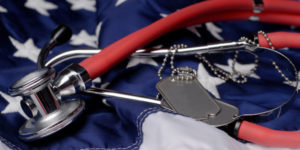
“In honor of Flag Day…bring your worn American flags and drop it into the special receptacle. Thanks to our local Boy Scouts, VFWs, military organizations and American Legions for their help in properly retiring all collected American flags”
(Sign posted in the lobby of a major grocery store)
You’ve got to hand it to the U.S. Taking care of business when it comes to the American flag, a critical symbol for all the flag-waving rituals non-military American love to indulge in. Taking care of the human beings who carry out the actions all that flag-waving inspires — not so much. 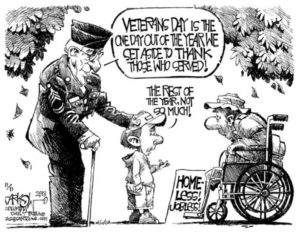 Perhaps that has something to do with the fact that less than one-half of one percent (.4%) of Americans serve in the military. Those who are serving are not the powerful and privileged who would demand attention and probably get it. They’re mostly “just folks,” who for patriotic reasons or lack of other options enlist.
Perhaps that has something to do with the fact that less than one-half of one percent (.4%) of Americans serve in the military. Those who are serving are not the powerful and privileged who would demand attention and probably get it. They’re mostly “just folks,” who for patriotic reasons or lack of other options enlist.
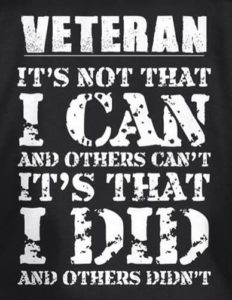 Since the U.S. abolished conscription (the draft) in 1973, the gulf between the military and the rest of us has been widening. Far removed from the days when military service was a badge of honor, today most of us prefer to sit on the sidelines. America’s elected leaders share our disinclination. In 1975, 75% of Congress had some military service. Today, only 20% are veterans. Rest assured that even fewer of their children are rushing to enlist. Two of our last three presidents took full advantage of draft deferments and, in the case of George W. Bush served in the National Guard to escape Vietnam. While the elites have opted to cheerlead for America’s wars rather than fight them, we still have 1.4 million courageous souls forming the backbone of America’s fighting force. For non-servers, a hastily-whispered
Since the U.S. abolished conscription (the draft) in 1973, the gulf between the military and the rest of us has been widening. Far removed from the days when military service was a badge of honor, today most of us prefer to sit on the sidelines. America’s elected leaders share our disinclination. In 1975, 75% of Congress had some military service. Today, only 20% are veterans. Rest assured that even fewer of their children are rushing to enlist. Two of our last three presidents took full advantage of draft deferments and, in the case of George W. Bush served in the National Guard to escape Vietnam. While the elites have opted to cheerlead for America’s wars rather than fight them, we still have 1.4 million courageous souls forming the backbone of America’s fighting force. For non-servers, a hastily-whispered  “thank you for your service” in the checkout line at the grocery store and a ceremonial salute to the flag at sporting events and other celebratory occasions pretty much takes care of the veneration part of honoring our soldiers.
“thank you for your service” in the checkout line at the grocery store and a ceremonial salute to the flag at sporting events and other celebratory occasions pretty much takes care of the veneration part of honoring our soldiers.
That doesn’t pass the sniff test. Particularly as our respect for the troops generally encompasses only those who return without discernible physical or mental injuries. Many Americans were aghast when Donald Trump indicated his preference for unscathed soldiers (“I like people who weren’t captured”). Let’s be honest — our treatment of returning veterans comes painfully close to reflecting the innate cruelty of that remark. One indication of that neglect are troubling suicide statistics. Between 2001 and 2014, while the suicide rate for civilian adults rose 23%, the suicide rate among veterans rose over 32%.
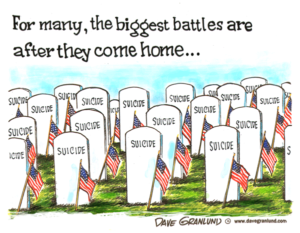
20 veterans per day take their own lives. Of that total, 65% are older than 50 and most were not involved in the most recent U.S. shooting wars. That so many veterans from wars other than Iraq and Afghanistan are committing suicide in unprecedented numbers is a testament to the failure of top Pentagon brass to ensure that wounded vets receive more than lip service. Starting wars is child’s play. Taking care of those who are injured is harder. For many grieving families, the indifference of the military to those who are no longer able-bodied is a betrayal of trust.
 That’s not the only indignity suffered by those who serve. The brutal indifference to their lives reaches beyond the grave. When a soldier in the military dies, standard procedure requires the President to send a condolence letter to the grieving family. That doesn’t happen to soldiers who commit suicide. Their families get no recognition of their loved one’s service to America. Even Obama, praised by liberals for his compassion, continued to send letters only to families whose loved ones died in approved ways. Look for President Trump to carry on this hateful, demeaning policy.
That’s not the only indignity suffered by those who serve. The brutal indifference to their lives reaches beyond the grave. When a soldier in the military dies, standard procedure requires the President to send a condolence letter to the grieving family. That doesn’t happen to soldiers who commit suicide. Their families get no recognition of their loved one’s service to America. Even Obama, praised by liberals for his compassion, continued to send letters only to families whose loved ones died in approved ways. Look for President Trump to carry on this hateful, demeaning policy.
Soldiers who have the misfortune to return from the battlefield with life-changing disabilities quickly experience the dark side of the never-ending invocation to honor our troops. When even the Department of Veterans Affairs comes clean about the scope of the problem — about one million Iraq and Afghanistan veterans have one or more disabilities — it’s time to come up with more and better ways to care for them. The VA has another solution — pretend that the problem doesn’t exist — in 2013, they stopped releasing figures on the health needs and disability claims of the 2.6 million U.S. service members who served in the Iraq and Afghanistan wars, citing the usual excuse “national security.” They didn’t get away with that brazen move for long. Public outcry resulted in its revocation.

The next time you are asked to stand at your fourth grader’s soccer match to “honor our troops” think about the one million soldiers who need real support to get on with their lives. 100,000 of them are currently in limbo having filed for disability benefits and wound up stuck in the queue. Many will wait years to have their claims adjudicated. For those who are refused (80% of Gulf War veterans were refused the first time they applied), appeal procedures take years longer.
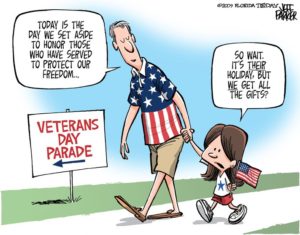
What about the care that wounded veterans have a right to expect from the government that put them in harm’s way in the first place? According to the New York Times in July, 2016, “526,000 veterans [were] waiting more than a month for care. And about 88,000 of them [were] waiting more than three months.”
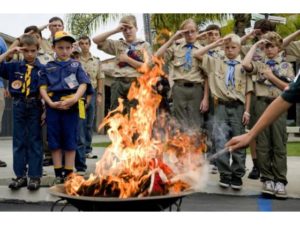 Count on it, if you have a tattered old American flag hanging around, a whole raft of agencies, the Boy Scouts, VFW, American Legion, will take good care of it. If you are a healthy veteran, you will be showered with thanks for your service, will be honored at sporting events, concerts, and other celebrations, will get discounts at a variety of stores, and will generally bask in the glow of a nation’s gratitude for not having to fight the wars themselves. If you are a wounded or disabled veteran from a war in the late twentieth or twenty-first century, you’re out of luck. The help you need will be MIA.
Count on it, if you have a tattered old American flag hanging around, a whole raft of agencies, the Boy Scouts, VFW, American Legion, will take good care of it. If you are a healthy veteran, you will be showered with thanks for your service, will be honored at sporting events, concerts, and other celebrations, will get discounts at a variety of stores, and will generally bask in the glow of a nation’s gratitude for not having to fight the wars themselves. If you are a wounded or disabled veteran from a war in the late twentieth or twenty-first century, you’re out of luck. The help you need will be MIA.  Your medical care will take far too long, programs to help you manage the mental and emotional problems arising from your service will be mostly non-existent and the monetary benefits that you deserve will come too late or be denied.
Your medical care will take far too long, programs to help you manage the mental and emotional problems arising from your service will be mostly non-existent and the monetary benefits that you deserve will come too late or be denied.
Think of that the next time you are tempted to say to a soldier in uniform “Thank You for Your Service.”

Sadly, as a country we do not appear to have organizations that can advocate for veterans of all branches of the Armed Services and the benefits they deserve. We will keep searching and will update you.
Do you know of an Organization worth sharing? Please comment below or email us at info@suspiciousangels.com

Follow Us on Twitter @SUSPIANGELS
Don’t forget to Like uson Facebook too https://www.facebook.com/suspiangels/
739 total views, 3 views today
